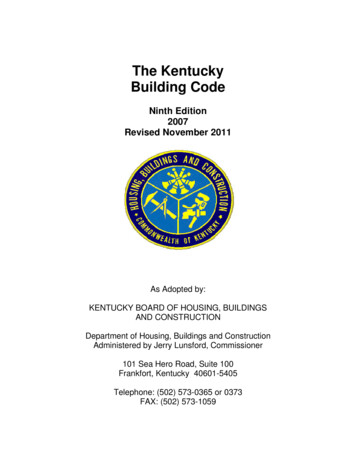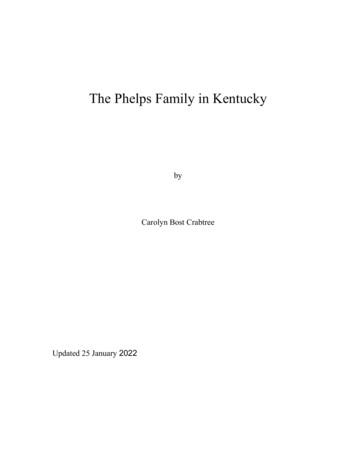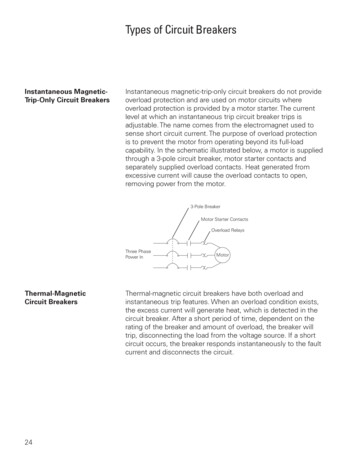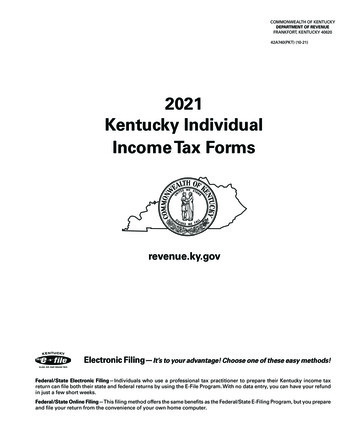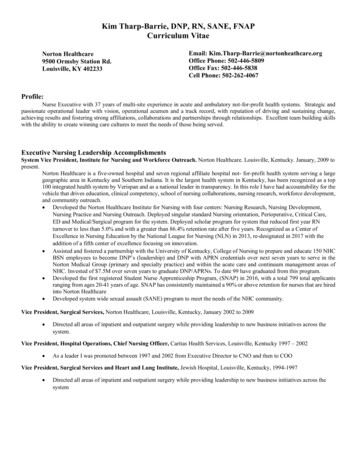
Transcription
COMMONWEALTH OF KENTUCKYFRANKLIN CIRCUIT COURTDIVISION ICIVIL ACTION NO. 21-CI-00798KENTUCKY STATE UNIVERSITY FOUNDATION, INC.v.PLAINTIFFOPINION AND ORDERFRANKFORT NEWSMEDIA, LLC d/b/aTHE STATE JOURNALDEFENDANTThis matter is before the Court on the Motion for Summary Judgment filed by Defendant,Frankfort Newsmedia, LLC d/b/a The State Journal (“Defendant” or “the State Journal”). Allparties fully briefed the merits of the case. Being sufficiently advised, the Court hereby GRANTSDefendant’s Motion because there is no genuine issue of material fact as to whether PlaintiffKentucky State University Foundation, Inc. (the “Plaintiff” or the “KSU Foundation”) is a “publicagency” for purposes of the Kentucky Open Records Act (the “KORA”) and, as such, subject tothe KORA’s record inspection provisions.BACKGROUNDOn May 24, 2021, the State Journal submitted a KORA request to the KSU Foundationseeking records related to payments made to a specific individual for a two-year period, as wellas “payments made for the purposes of parties celebrating the [specific individual’s] birthday[.]”21-ORD-179 at 1. The [Defendant] also sought to inspect “any records or documentationPlaintiff denied the KORA request, claiming it “is not a public agency as defined by KRS61.870(1).” Compl., Exhibit 4. On September 10, 2021, Defendant filed an appeal with theOffice of the Attorney General (“OAG”) to which Plaintiff responded on September 17, 2021.Page 1 of 14OPOR : 000001 of 000014reflecting payments of more than 1,500 made to any entity or individual[.]” Id.
Compl., Exhibit 1. The KSU Foundation argued to the OAG that it is not a public agencybecause it receives no public funds, it is not controlled by Kentucky State University (the“University”), it has changed its structure since the Kentucky Supreme Court determined it to bea “public agency” under KORA in 1992, and it has total control over deciding whether to grantthe University’s disbursement requests. Id.On September 23, 2021, the OAG issued 21-ORD-179, which relied on a 1992 KentuckySupreme Court decision in which the KSU Foundation denied a KORA request in almostidentical circumstances. There, the Kentucky Supreme Court squarely held that the KSUFoundation was a public agency. Frankfort Publ’g Co. v. Kentucky State Univ. Found., Inc., 834S.W.2d 681 (Ky. 1992). In examining whether subsequent organizational changes to theFoundation made the holding in Frankfort Publ’g Co. inapplicable, the OAG noted “[t]heFoundation provides no evidence that clarifies how its Board of Directors is selected.” 21-ORD179, footnote 1. Ultimately, the OAG was not persuaded that subsequent changes to the structureof the KSU Foundation Board of Directors or the definition of “public agency” under KRS61.870 affected Plaintiff’s status as a “public agency” under KORA, holding “in the absence ofany evidence that explains how the Foundation’s Board of Directors are now selected, theFoundation is still a public agency under KRS 61.870(1)(i).” Id. at 4. The Attorney Generalfound that the KSU Foundation was subject to KORA, and it was required to provide responsiverecords.This Court has subject matter jurisdiction under KRS 61.882(1). A circuit court’s reviewof an Attorney General Opinion is de novo. Valentine v. Personnel Cabinet, 322 S.W.3d 505,507 (Ky. App. 2010) (quoting Medley v. Board of Educ., Shelby County, 168 S.W.3d 398, 402Page 2 of 14OPOR : 000002 of 000014STANDARD OF REVIEW
(Ky. App. 2004)) and KRS 61.882(3). As such, questions of law are reviewed without deferenceto the original decision of the agency. Medley v. Board of Education of Shelby Co., 168 S.W. 3d398 (Ky. App. 2004). A reviewing court is not bound by the Attorney General’s Opinions, butthe Court may give “great weight to the reasoning and the opinion expressed” by the AttorneyGeneral in an Open Records Case. York v. Comm., 815 S.W.2d 415, 417 (Ky. Ct. App. 1991).When weighing summary judgment, the proper standard is whether “there is no genuineissue as to any material fact and that the moving party is entitled to judgment as a matter oflaw.” CR 5603. The movant should not succeed unless it has shown “with such clarity that thereis no room left for controversy.” See Steelvest, Inc. v. Scansteel Service Ctr., 807 S.W.2d 476,482 (Ky. 1991). In reviewing motions for summary judgment, the Court views all facts in thelight most favorable to the non-moving party and resolves all doubts in its favor. Id. at 480. Andsummary judgment should only be granted when the facts indicate that the nonmoving partycannot produce evidence at trial that would render a favorable judgement. Id.Summary judgment is a device that should be used with caution and is not a substitute fortrial. “[T]he proper function of summary judgment is to terminate litigation when, as a matter oflaw, it appears that it would be impossible for the respondent to produce evidence at the trialwarranting a judgment in his favor.” Jones v. Abner, 335 S.W.3d 471, 480 (Ky. App. 2011). Thequestion presented here is strictly a legal issue, making summary judgment appropriate.In applying the Open Records Act, the Court is bound to follow the legislative commandexceptions to the rule of open examination of public records “shall be strictly construed, eventhough such examination bay cause inconvenience or embarrassment to public officials orothers.” KRS 61.871.Page 3 of 14OPOR : 000003 of 000014that “free and open examination of public records is in the public interest” and that any
ANALYSISIn 1992 the Kentucky Supreme Court held that the KSU Foundation is a “public agency”for purposes of the KORA in a case where, like this one, the State Journal sought certain recordsfrom the KSU Foundation (“the 1992 KORA decision”). Frankfort Pub. Co. v. Kentucky StateUniversity Foundation, Inc., 834 S.W.2d 681 (Ky. 1992). The Supreme Court’s holdinginterpreted the language “or agency thereof” in KRS 61.870(1) and also looked to the overallpurpose of the KORA. Id. at 682 (“An interpretation of KRS 61.870(1), which does not includeFoundation as a public agency, is clearly inconsistent with the natural and harmonious reading ofKRS 61.870 considering the overall purpose of the Kentucky Open Records law.”).The KSU Foundation explains that subsequent to the 1992 KORA decision it madeorganizational changes to its Board of Trustees as well as how operational interactions with theUniversity occurred. Memorandum in Support of the Plaintiff’s Response to the Motion forSummary Judgment (“Plaintiff’s Response”), 1-2. These changes, it argues, result in a structurein which the University and the KSU Foundation operate as two separate entities. Id. Plaintifffurther contends that amendments made to KRS 61.870(1) subsequent to the 1992 KORAdecision make the Supreme Court’s interpretation of the language “of agency thereof” in thatcase irrelevant when applying the present statute. While the KSU Foundation may be a separatelegal entity, it is affiliated with KSU in such significant ways that it is clear that its relationshipto KSU is that of agent to principal. It exists to further the mission of KSU, and to implementlong as the KSU Foundation has the primary purpose of supporting KSU, and it holds anddistributes its funds for the sole benefit of KSU, it must be “an agency thereof” for purposes ofthe Open Records Act.Page 4 of 14OPOR : 000004 of 000014policies that support KSU, its students and programs. It has no other reason for existence. So
With regard to the statutory modifications to 61.870(1) that occurred after the 1992KORA decision, the Court of Appeal has explicitly held that “this modification of KRS 61.870would have no effect on the holding in [the 1992 KORA decision].” University of LouisvilleFoundation, Inc. v. Cape Publications, Inc., 2003 WL 22748265 at *7 (Ky. App. 2003). In theUniversity of Louisville Foundation case, the Court of Appeals affirmed a trial court ruling thatthe University’s private foundation was a public agency for purposes of the Open Records Act.The Kentucky Supreme Court denied discretionary review of that decision, and later held that theidentity of donors to the U of L Foundation are subject to disclosure under the Open RecordsAct. Cape Publications, Inc. v. University of Louisville Foundation, Inc. 260 S.W.3d 818 (Ky.2008).However, even if the amendments to the statute did supersede the holding in that case,the KSU Foundation still falls squarely within the revised definition of “public agency.”Amendments to KRS 61.870(1) made the defined term “public agency” more specific bycreating eleven subsections under KRS 61.870(1) (i.e., KRS 61.870(1)(a)-(k)) under which anentity will be considered a “public agency.” As detailed below, two subsections of the “publicagency” definition, KRS 61.870(1)(i) and (j), apply to the KSU Foundation irrespective of theorganizational and operational changes it implemented in an effort to avoid suchcharacterization.I.The KSU Foundation is a “Public Agency” Because it is Established, Created, andControlled by the University (KRS 61.870(1)(j))“established, created, and controlled” by another public agency (i.e., the University). It isundisputed that the members of the University’s Board of Regents, which is without question a“public agency,” acting in its official capacity “established” and “created” the KSU Foundation.Page 5 of 14OPOR : 000005 of 000014The Foundation will be treated as a “public agency” under KRS 61.870(1)(j) if it is
Memorandum in Support of Defendant Frankfort Newsmedia, LLC’s Motion for SummaryJudgment (“Defendant’s Memo”), Exhibit 2 (KSUF’s Responses to The State Journal’s Requestsfor Admission). Accordingly, the only issue in dispute as to whether the KSU Foundation is a“public agency” under KRS 61.870(1)(j) is whether it is “controlled” by the University.The sole purpose of the KSU Foundation is to support and advance the mission of theUniversity. It is bound by its Articles of Incorporation, By-Laws, and tax exempt status with theInternal Revenue Service under Section 501(C)(3), to limit its activities to support of KSU. Ithas no legal authority to do anything other than provide support to the University. Those factsstanding alone establish that KSU has legal control over the KSU Foundation.In defining “control,” we look to how that term has been interpreted in the context of theKORA rather than any meaning assigned to the term under separate statutory frameworks.1 TheCourt of Appeals, analyzing a substantially similar university-foundation relationship, has heldthat a university and its foundation “acting as one and the same” amounts to “control.”University of Louisville Foundation, Inc., 2003 WL 22748265 at *7. In addition, the KentuckySupreme Court has provided guidance on the issue of “control” in a similar factual context,recognizing that a university’s “exercise [of] extensive ongoing ‘control’ of [its] [f]oundation”through contractual agreements governing the affairs of such foundation “supports theconclusion that the [f]oundation is a public agency for open records purposes pursuant to KRS61.870(1)(j).” Kearney v. Univ. of Ky., 638 S.W.3d 385, 395 n.11 (Ky. 2022) (quoting LachimAs a matter of law, allPlaintiff’s reliance on the definition of “control” set forth in KRS 271B.12-200(7) (“[T]he power to direct or causethe direction of the management and policies of a person.”) is not controlling for purposes of the KORA. Plaintiff’sResponse at 8. However, even if this definition were to be applied, there is uncontroverted evidence in the recordestablishing that the management and policies of the KSU Foundation must, under the MOU, align with theUniversity’s priorities, which satisfies KRS 271B.12-200(7)’s definition of “control.”1Page 6 of 14OPOR : 000006 of 000014Hatemi/Kentucky Medical Services Foundation, Inc., 15-ORD-205).
funds of the Foundation are held in trust for the benefit of the University, and accordingly, suchfunds must be subject to the same scrutiny under KORA as funds held directly by the Universityitself.The University cannot circumvent public scrutiny and accountability under KORA byrouting money held in trust for the University through a charitable entity established by theUniversity. KORA does not allow a public agency to do indirectly what the law forbids it dodirectly.A.The University Exercises Control Through Contractual RequirementsThe KSU Foundation publicly holds itself out as acting “for the benefit of Kentucky StateUniversity or for any student, faculty or staff members, or any line of work, teaching orinvestigation of Kentucky State University.” Defendant’s Memo, Exhibit 4 (“Our Mission,”Introduction to the Foundation’s Triennial Report); see also Defendant’s Memo at fn 50 (Thepurpose of the KSU Foundation is “to raise and secure funding from any and all sources tosupport the educational and research efforts of Kentucky State University.”).This mission is solidified through a number of provisions in a Memorandum ofUnderstanding (“MOU”) entered into between the University and the KSU Foundation on March11, 2019. Defendant’s Memo, Exhibit 5 (Memorandum of Understanding BetweenCommonwealth of Kentucky, Kentucky State University and Kentucky State UniversityFoundation, Inc.). The first paragraph of the MOU identifies the purpose for the parties enteringinto the agreement: “to advance the mission of Kentucky State University.” Subsequentinextricably linked to the mission and priorities of the University.2 The longest section of theFor example: “The Foundation was organized . . . for the purpose of stimulating voluntary private support . . . forthe benefit of the University”; “The Foundation exists to raise and manage private resources supporting the missionand priorities of the University . . . .”; and, “The Foundation is dedicated to assisting the University . . . inaddressing, through financial support, the long-term academic and other priorities of the University.”2Page 7 of 14OPOR : 000007 of 000014introductory paragraphs describe the KSU Foundation’s business purpose as one that is
MOU, comprising nearly two of the MOU’s five full-text pages, is entitled “Foundation’sResponsibilities” and includes five subsections that set forth specific duties of the KSUFoundation, including: Fund Raising and Stewardshipo “The Foundation shall create an environment conducive to increasinglevels of private support for the mission and priorities of the University.”o “The Foundation shall support the University with the planning andexecuting comprehensive fund-raising and donor-acquisition programs insupport of the University’s mission.o “The Foundation will establish, adhere to, and periodically assess giftmanagement and acceptance policies. It will promptly acknowledge andissue receipts for all gifts on behalf of the Foundation and University . . .”o The Foundation recognizes and defers to the University [on fundraising] . . .”o “The Foundation will collaborate with designated University official(s) toidentify and cultivate prospects for private gifts . . . .” Asset Managemento “The Foundation will engage an independent accounting firm annually towill provide the University with a copy of the audited financial statementsincluding management letters.” Institutional FlexibilityPage 8 of 14OPOR : 000008 of 000014conduct an audit of the Foundation’s financial and operational records and
o “The Foundation will explore current opportunities, including acquisitionand management of real estate on behalf of the University for futureallocation, transfer, or use.” Transfer of Fundso “The Foundation is the primary depositary of private gifts and will transferfunds to the designated entity within the institution in compliance with . . .University policies . . . .” F subject to the Open Records Act.Here, we have a request for public records concerning funds held in trust for the public agency,and the Open Records Act requires that such funds shall be subject to the public accountabilitythat comes with public disclosure under KORA.B.The University Exercises Control Through Practices Related to the Receiptand Disbursement of FundsIn addition to the University’s exercise of “control” through the MOU provisions, theUniversity also exercises control over the KSU Foundation through practices surrounding thereceipt and disbursement of Foundation funds. More specifically, these practices show the two“control.”With regard to receipt of funds, the University’s web page explicitly asks for donations tobe made payable to the Foundation but mailed to the University. Defendant’s Memo at 15 andPage 11 of 14OPOR : 000011 of 000014entities “acting as one and the same,” which the Court of Appeals has found to equate with
Exhibit 6 (The Foundation’s Answers to The State Journal’s Interrogatories), 8 (“Checks mailedto [the University] for [the Foundation]” are “brought to the Foundation by courier.”). Throughthis process, the University controls the manner in which donations are made as well as thelogistics of how such donations are physically delivered to the Foundation.The process for disbursements also demonstrates that the University and the KSUFoundation “act as one and the same.” The University requests disbursements from theFoundation using a Disbursement Request Form, which is printed on dual University/Foundationletterhead. Id. at Exhibit 11. The Form requires University information (i.e., the department,campus address, and campus phone number of the person making the request) as well asFoundation information (i.e., name and account number of the Foundation account from whichdisbursement is requested). Id. The fact that the form is printed on dual letterhead and requiresinformation from both the University and the Foundation is indicative of the two entities “actingas one and the same.” The University’s possession of Foundation account numbers is alsoindicative of the University exercising control over the Foundation.The University’s control of the Foundation can also be seen in the practices aroundeveryday use of the Disbursement Request Form. That is, in instances where information isomitted from the Form, the Foundation nevertheless complies with the request and disbursesfunds. Id. at Exhibit 6 (KSUF’s Answers to The State Journal’s Interrogatories) at 5-6 (listingtwo instances in which the Foundation denied University disbursement requests over the pastForm); see also Id. at Exhibits 12-23 (Disbursement Request Forms completed on behalf ofvarious University departments/activities). Moreover, the types of Foundation accounts fromwhich disbursements are requested also evidence the University and Foundation “acting as onePage 12 of 14OPOR : 000012 of 000014five years neither of which involved failure to provide information on the Disbursement Request
and the same.” For example, the Foundation maintains both an unrestricted fund and adiscretionary fund for the University President. Id. at Exhibits 12 and 13. The Foundation alsomaintains operational accounts for various University departments, such as Athletics and CareerServices. Id. at Exhibits 14 and 15. Finally, the Foundation maintains accounts for specificUniversity groups or teams, such as the University’s Jazz Ensemble, Football team, Basketballteam, Baseball team, Softball team, Golf team, Cheerleading team, and the Delta Sigma Thetasorority chapter. Id. at Exhibits 16-23.II.The KSU Foundation is a Public Agency Because of How Its Board is AppointedUnder KRS 61.870(1)(i), the Foundation is a public entity if “the majority of itsgoverning body is appointed by a public agency[;] . . . by a member or employee of such a publicagency; or by any combination thereof[.]”Initially, the KSU Foundation’s Board of Trustees consisted of the University’sPresident, the President of the University’s Alumni Association, and the Chairman and ViceChairman of the University’s Board of Regents, individuals which are all “member[s] oremployee[s]” of the University, a “public agency,” under KRS 61.870(1)(i). Compl., Exhibit 6.This Board of Trustees was then tasked with electing all future members of the Board ofTrustees. Id. Although the KSU Foundation’s Articles of Incorporation were subsequentlyamended, its Board of Trustees was still tasked with electing all future members of the Board ofTrustees. Compl., Exhibit 7. Applying these rules, from the time of the amendment of thehe or she was appointed by a public agency. This self-perpetuating appointment of new membersfor the Board of Trustees does not somehow break the chain of appointment by a public agency.See University Medical Center, Inc. v. American Civil Liberties Union of Kentucky, Inc., 467Page 13 of 14OPOR : 000013 of 000014Articles of Incorporation to present, each time a member of the Board of Trustees was appointed,
S.W.3d 790, 799 (holding that the University Medical Center, which operates University ofLouisville Hospital and related facilities, was a “public agency” because the substance of itsBoard member selection process gave the University the ability to appoint a majority of theBoard).CONCLUSIONFor all the reasons set forth above, the Court hereby GRANTS Defendant’s Motionbecause there is no genuine issue of material fact as to whether the Foundation is a “public agency”for purposes of the KORA. As a “public agency,” the Foundation is subject to the KORA’s recordinspection provisions, and the Foundation is required to provide copies of the requested records incompliance with KORA. The Foundation is directed to provide copies of the requested recordsto the Defendant State-Journal within 10 days of the entry of this Order.So ORDERED this, 11th day of August, 2022.PHILLIP J. SHEPHERD, JUDGEFranklin Circuit Court, Division IDistribution:Edwin A. LoganLogan Burch & Fox114 West Clinton StreetFrankfort, Kentucky 40601Counsel for PlaintiffOPOR : 000014 of 000014Jeremy RogersSuzanne MarinoDinsmore & Shohl LLP101 South Fifth Street, Suite 2500Louisville, Kentucky 40202Counsel for DefendantPage 14 of 14
Kentucky State University Foundation, Inc. (the "Plaintiff" or the "KSU Foundation") is a "public agency" for purposes of the Kentucky Open Records Act (the "KORA") and, as such, subject to the KORA's record inspection provisions. BACKGROUND On May 24, 2021, the State Journal submitted a KORA request to the KSU Foundation
